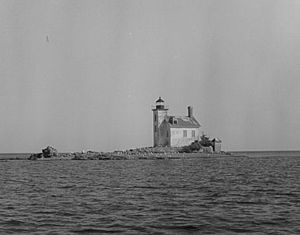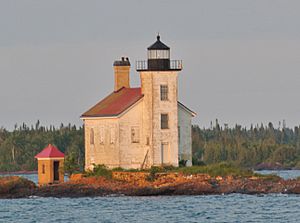Gull Rock Light Station facts for kids
 |
|
| Undated USCG photo. | |
|
|
|
| Location | West of Manitou Island, Grant Township, Keweenaw County, Michigan |
|---|---|
| Coordinates | 47°25′2″N 87°39′49″W / 47.41722°N 87.66361°W |
| Year first constructed | 1867 |
| Year first lit | 1867 |
| Automated | 1913 |
| Construction | Brick |
| Tower shape | Square brick tower with cast iron lantern room. and gallery attached church-style” to 2-story brick Light keeper's house |
| Markings / pattern | white with black lantern and red roof on house |
| Height | 46 feet (14 m) |
| Focal height | 50 feet (15 m) |
| Original lens | Fourth order Fresnel lens |
| Current lens | 9.8-inch (250 mm) Tideland Signal acrylic lens |
| Range | 7.8 nautical miles; 14 kilometres (9 mi) |
| Characteristic | 2 white flashes every 5 seconds. 0.4s fl 0.6s ec. 0.4s fl 3.6s ec. |
| ARLHS number | USA-361 |
| USCG number | 7-15165 |
The Gull Rock Light Station is an active lighthouse found on Gull Rock. This small rock is located just west of Manitou Island. It sits off the tip of Michigan's Keweenaw Peninsula in Lake Superior. The lighthouse was added to the National Register of Historic Places in 1984. Even so, its condition got worse, leading to it being placed on the Lighthouse Digest Doomsday List. This list highlights lighthouses that are in danger of being lost.
Contents
Building the Gull Rock Lighthouse
Gull Rock is a tiny island that is actually the top of an underwater mountain. It sits between the tip of the Keweenaw Peninsula and Manitou Island.
The eastern side of the Keweenaw Peninsula has a bay that protects ships from strong winds. However, the area near Gull Rock was very dangerous for sailors. This small islet is about half a mile off Manitou Island's western tip. Because of this danger, in 1866, the United States Congress approved $15,000 to build a lighthouse on Gull Rock.
Construction started in 1867. The light began working on November 1 of the same year. This lighthouse shares its design with the Granite Island Light and Huron Island Light Station.
Changes and Challenges Over Time
In 1901, a 40-foot (12 m) wall was built to protect the lighthouse. This wall was placed northeast of the building. It helped stop waves from washing over the island.
In 1913, the light was made automatic. This meant a lighthouse keeper was no longer needed there all the time. The keeper of the nearby Manitou Island Light Station became responsible for it. After this, Gull Rock Light was mostly left alone. The station started to fall apart.
In 2005, a group called the Gull Rock Lightkeepers took over the station. This is a non-profit organization. They are working to fix up the lighthouse. It is still used today to help guide ships.
The original lens was a Fourth Order Fresnel lens. It was made by Barbier and Fenestre in Paris. Some people say this lens is now at the Whitefish Point Great Lakes Shipwreck Museum. However, some experts believe it might be a different lens.
The lighthouse is painted white. Its lantern and gallery are black. The roofs of the buildings are red. This lighthouse is in serious danger from erosion and waves. It remains on the Lighthouse Digest Doomsday List.
Shipwrecks and Safety Concerns
The rocky shoals around Gull Rock caused problems for many ships. Six vessels ran aground there between 1907 and 1926. These ships included the Spokane, E.N. Saunders, L.C. Waldo, Taurus, Samuel Mather, and Charles C. West. Luckily, all these ships were saved and could sail again.
The main reason for these accidents was likely low visibility due to fog. The lighthouse did not have a fog signal to warn ships. This was a problem because Gull Rock was hard to see. It stands less than twelve feet above the water. In stormy weather, it could become almost invisible.
Major repairs were done on the lighthouse in the summer of 2012. These repairs helped strengthen the structure.
What the Lighthouse Looks Like
The Gull Rock Light includes the light tower and a house for the keeper. The tower is made of brick. It is 46 feet (14 m) tall and has stairs inside. The top part, called the lantern, is made of iron. It has ten sides and vertical bars.
The original lens was a Fourth Order Fresnel lens. It was later replaced with a 9.8-inch (250 mm) plastic lens. This newer lens is still used in the lighthouse today.
The keeper's house has two stories and is made of brick. It has a sloped roof. Because it was empty for so long, the inside of the house is badly damaged. It used to have a window that stuck out from the roof, but that is now gone. There is also a brick outhouse on the site that is still there.
Visiting Gull Rock Light
The Gull Rock Light is closed to visitors. You cannot go inside or walk around the island. However, you can see the lighthouse from a private boat. You can also take lighthouse cruises. These tours are offered by the Keweenaw Star from Houghton, Michigan, and the Isle Royale Queen IV from Copper Harbor, Michigan.
 | Dorothy Vaughan |
 | Charles Henry Turner |
 | Hildrus Poindexter |
 | Henry Cecil McBay |



